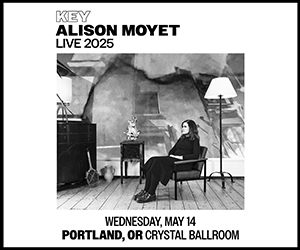Home > DJ / Electro
03/16/2015
Natasha Kmeto: Crisis to Comfort – from OMN the Mag
BY ROBERT HAM // Natasha Kmeto’s first album, Crisis, was aptly named. It was a beat-heavy exploration of the frustration and confusion, and lust and joy of an unsettled romantic relationship, an especially critical situation when it became apparent her partner might be gone for good.
Natasha Kmeto’s first album, Crisis, was aptly named. It was a beat-heavy exploration of the frustration and confusion, and lust and joy of an unsettled romantic relationship, an especially critical situation when it became apparent her partner might be gone for good.
In the time since she wrote and recorded those songs, things are much more settled. She and that same partner are now engaged with an eye on a fall wedding. And the acclaim that she received for Crisis found a very welcome benefactor in Dave Sitek, one of the founders of Indie Rock futurists TV on the Radio, who brought Kmeto along as an opening act for his band’s recent U.S. tour and is releasing her next album on his Federal Prism label.
So, although she faced a number of trials to get to this comfortable place, it feels now like Kmeto was destined for these bigger and better things. Hence, the name of her second full-length album: Inevitable.
“I feel like this record is a counterpoint to Crisis,” Kmeto said recently over coffee. “There was a resolution to a lot of the stuff I was discussing on that album for me. It fell into a place where I knew it was going to work out. A lot of these songs are coming from a powerful place rather than a desirous place.”
There’s still plenty of desire oozing through many of the songs on Inevitable, but the yearning is far more physical than emotional (“You thought you knew everything that there was to me/until I’m taking over,” she sings over the sultry electro-trap beats of “Peak”.) But there’s no denying the brawn and confidence of this album.
Every track feels so much bigger and more spirited than anything Kmeto has made before. The beats have a little more flash to them, with deep bass responses and swimmy synth tones that invoke the spirits of early Boards of Canada and Kanye-adjacent producers like Hudson Mohawke. It’s more of a piece of modern R&B than the current strain of EDM, heavy laden as it is with emotion and heat.
Inevitable also marks a rare move by Kmeto to hand over at least some of the creative control of the album to another person. Although she recorded all of the music in her bedroom (the same place where she has put together all of her previous work), she laid down all the vocals in Sitek’s L.A.-based studio and left the mixing in the hands of in-house engineer Matty Green.
“I actually hate mixing my own stuff,” she says. “It’s always been a necessity because I’m not just going to give my baby over to anybody. But from the first song he mixed I knew, ‘This guy understands what I’m getting at.’ I could try and describe what I was looking for and he knew exactly what to do.”
The album also represents the first time she brought in another singer to join her on a song. Not just any singer, mind you, but TV on the Radio vocalist Tunde Adebimpe who added his dynamic tones to the sweat-inducing “Grind”.
“I was trying to get Ish[mael Butler] from Shabazz Palaces on that track, but it fell through timing wise,” Kmeto remembers. “Dave said, ‘What about Tunde?’ I was like, ‘I didn’t know that was an option!’ We cut in 20 minutes. It’s not like I had to tell him what to do. I would have a really hard time telling a guy like that what to sing.”

The inclusion of all these male voices and hands into the project does come with its complications. Like so many solo female acts, Kmeto has a frustrating time trying to assure some less enlightened music fans that she is the person who programs every beat, writes every lyric, and plays every instrument on every song she releases.
“When I was on the road with TV on the Radio,” she says, “I made a point of saying, in the middle of my set, that the reason I’m up here alone is because I am the one doing everything. It’s just not part of the discussion. I have a hard time taking offense to it. It’s mostly ignorance, not maliciousness.”
That said, even though her lyrics don’t touch on political subjects, having a female artist on stage looping synth lines, building beats from scratch, and singing her heart out on top of it is a huge statement, especially in an electronic music scene dominated by either male braggarts or female mouthpieces singing songs written by male producers.
When I make that comment, Kmeto couldn’t have responded faster in agreement.
“Absolutely! I made a conscious decision early on to not ostracize myself in way where I could be pigeonholed as a woman or as a lesbian or as an Asian-American. I wanted to keep my music at the forefront with a storyline people can relate to without realizing they were relating to this queer woman. That’s political in and of itself. But it’s also in how I perform and how I speak about certain issues in interviews that makes me more proactively political. No matter what, I think it needs to be out there.”








